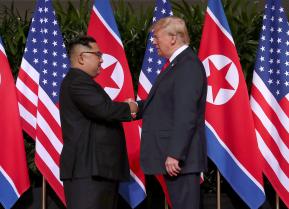Forget about North Korea: Pakistan and India Are Near the Nuclear Abyss
What happens now?
Amid an escalating exchange of violence and insults, India and Pakistan could be on the brink of open warfare. Experts are scrambling to predict what could happen next -- and what the rest of the world should do as two nuclear-armed states clash.
A Feb. 14, 2019 terror bombing in Indian-controlled Kashmir sparked the chain reaction. Pakistan-based terror group Jaish-e-Mohammed claimed responsibility for the attack, which killed 40 Indian policemen.
On Feb. 25, Pakistani JF-17 fighters reportedly scrambled to intercept Indian jets probing Pakistani air space near Kashmir. Pakistani major general Asif Ghafoor claimed the Indian planes jettisoned their weapons near the town of Balakot and retreated.
A day later on Feb. 26, 2019, Indian planes crossed the line of control at India's border with Pakistan and bombed what New Dehli described as a Jaish-e-Mohammed training camp near Balakot.
Indian media reported that as many as a dozen Mirage 2000s took part in the mission alongside one of India's EMB-145 airborne early-warning aircraft, an Il-78 aerial tanker and at least one Israeli-made Heron drone.
The Indian air raid killed "a very large number of JEM terrorists," India’s foreign secretary claimed. Villagers, however, told Reuters only one person was wounded in the attack and no one died.
Islamabad threatened to retaliate. "We will respond and we will surprise you," a Pakistani military spokesperson said at a press conference. The "response will come at a point and time of our choosing."
The same day as the Balakot attack, Indian army troops reportedly used a Spyder missile to shoot down a Pakistani drone on a reconnaissance mission near the border. On Feb. 27, 2019, Pakistani F-16s crossed the line of control to attack Indian forces, New Delhi claimed.
Indian MiG-21s intercepted the F-16s and shot down one of them, according to the Indian government. Islamabad claimed its forces shot down two MiG-21s, but New Delhi copped to losing just one jet.
The Pakistani government circulated a video allegedly depicting a captured MiG-21 pilot. New Delhi demanded the pilot's immediate and safe return. India said it "strongly objects to Pakistan's vulgar display."
Terrorists based in Pakistan long have been a problem for New Delhi. "India has shown restraint following recent terrorist attacks emanating from Pakistan," wrote Richard Rossow, a senior adviser to the Washington, D.C. Center for Strategic and International Studies.
In September 2016, Indian special forces attacked a terrorist camp in Pakistan-occupied Kashmir following the terror attack against the Indian military base in Uri; while this 'surgical strike' received a great deal of attention, similar attacks against terrorist camps in Pakistan-occupied Kashmir had reportedly taken place before, though more quietly.
India’s air strike against targets in Pakistan on February 26 marks an escalated response in a couple of ways. First, this is the first time India has used air power against Pakistan since the two fought a war in 1971.
This is obviously significant since air power can move much faster than ground troops—meaning, once Pakistan recognizes a plane crosses into its air space, military leaders will have to quickly decide if India is launching an attack against a terrorist camp near the border or is instead headed towards military targets in Pakistan.
Second, this air attack hit targets in Pakistani territory. In contrast, India’s 2016 'surgical strike' hit terrorist targets in the disputed territory of Pakistan-occupied Kashmir. Kashmir’s contested status provides a small fig leaf to Pakistan when planning a response claiming it is not the nation’s own integral territory.
"The onus now falls on Pakistan to prevent escalation," wrote analyst Alyssa Ayres from the Washington, D.C. Council on Foreign Relations.
But instead, Pakistan has publicly announced a meeting of the National Command Authority on Feb. 27, effectively rattling nuclear sabres as this body oversees its nuclear weapons. Pakistan does not have a no-first-use nuclear doctrine. Nuclear escalation—long the worst-case fear for this region—would take things into the strategic and foreign policy realm of the unknown.
At this point, countries around the world that wish for peace in South Asia must press Pakistan to make better choices and uphold its obligations as a U.N. member state to prevent its territory from being used for terrorism. This is the provocation that has brought this region to the brink over and over again. This is the pressure point that must be pressed diplomatically.
David Axe serves as Defense Editor of the National Interest. He is the author of the graphic novels War Fix, War Is Boring and Machete Squad.
Image: Reuters.


